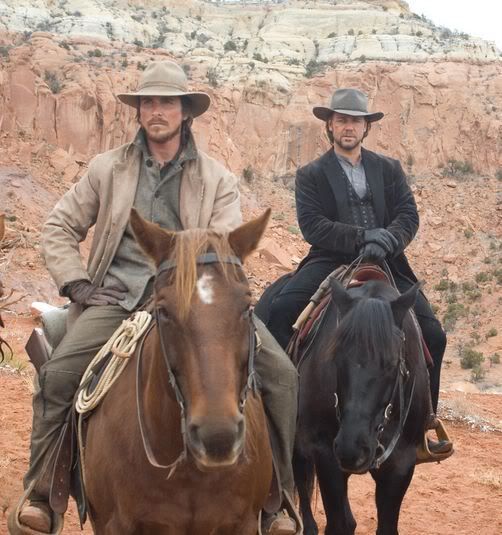
The New York Times magazine this past weekend was devoted to Hollywood's slow return to the western genre with the release of a handful of disparate films this season that either directly explore the genre or redefine its traditions in a contemporary revisionist context. I'm not convinced "The Assassination of Jesse James by the Coward Robert Ford" is a strict western in terms of its narrative conventions and tone, but with James Mangold's "3:10 to Yuma" and films that use the west as a template for meditating on American ideals and the promise of possibility the west represents in such films as Sean Penn's "Into the Wild" Paul Thomas Anderson's "There Will Be Blood", it's no denying that perhaps America is still trying to define itself by the eternal unknown beauty and danger of the West. These days the world is a little more violent and ethically undetermined of which can be seen exacted with grim stoicism in John Hillcoat's bloody "Proposition". The genre was turned on its ear and very obviously redesigned with Ang Lee's "Brokeback Mountain", where the new stranger in town that can't quite fit in is not one specific person but two men who find solace and something painfully honest in each other as their love grows as passionate and deep in a part of the world that doesn't want to understand or accept them. Clint Eastwood's 1992 revisionist western "Unforgiven" imbues the violence as carried out by the quintessential outlaw a new weight with the suggestion that life has supreme value and to take it away there is a moral cost to be paid. The western genre in a post-Vietnam, post-feminist movement, post-sexual revolution, post-9/11 world is not the black and white world of its classic and traditional early days. The same is a truth for America's own narrative.
I'm not a huge fan of westerns in general (although Robert Altman's "McCabe & Mrs. Miller" is beyond stunning) but the archetype of the misfit who enters town anew and burdened by his violent and questionable past is utterly fascinating and in a way, inherently cinematic. The lone stranger who for all his misgivings and aberrant tendencies can never fully join the good natured society he pines for but therein the great paradox exists in that there is an unspoken tacit agreement between the aimless drifter and his environment where the world needs him just as much as they are fearful and repulsed by him.
From the magazine and definitely worth a read:
Lynn Hirschberg's profile of Daniel Day-Lewis.
Jonathan Lethem on the greatest death scene.
Luc Sante on moral ambiguity as the chief weapon in westerns.
Monday, November 12, 2007
open range
Subscribe to:
Post Comments (Atom)



1 comment:
Being a closet-Western lover, I find the New Western Wave fascinating and lovely in its various incarnations.
Thanks for putting Out 1 in your links! I'm glad you enjoyed my use of "bucolic."
-Brandon
Post a Comment